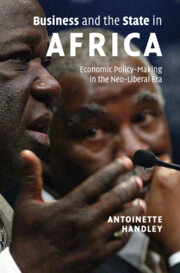Book contents
- Frontmatter
- Contents
- List of figures
- Acknowledgments
- List of abbreviations
- Introduction: the African business class and development
- Part one Institutionalizing constructive contestation
- 1 Ethnicity, race, and the development of the South African business class, 1870–1989
- 2 The neo-liberal era in South Africa: negotiating capitalist development
- 3 Business and government in Mauritius: public hostility, private pragmatism
- Part two Business and the neo-patrimonial state
- Conclusion: the business of economic policy-making, comparatively speaking
- Bibliography
- Index
3 - Business and government in Mauritius: public hostility, private pragmatism
Published online by Cambridge University Press: 22 September 2009
- Frontmatter
- Contents
- List of figures
- Acknowledgments
- List of abbreviations
- Introduction: the African business class and development
- Part one Institutionalizing constructive contestation
- 1 Ethnicity, race, and the development of the South African business class, 1870–1989
- 2 The neo-liberal era in South Africa: negotiating capitalist development
- 3 Business and government in Mauritius: public hostility, private pragmatism
- Part two Business and the neo-patrimonial state
- Conclusion: the business of economic policy-making, comparatively speaking
- Bibliography
- Index
Summary
[W]hen your members control 40 percent of exports you are listened to [by government].
In the Mauritius of the 1990s there appeared to be few political incentives for the government to consult seriously with its business community. Not only was the private sector dominated by an ethnic minority, but it was dominated by the very ethnic minority that historically had oppressed the majority group which subsequently assumed political power. Common sense, and much politics literature, tells us that such a setup invites economic and political conflict. Yet, despite a relatively high level of hostility between business and government, business was able to exert a moderate level of influence on economic policy in the 1990s and Mauritius has been described as “a case study in the successful management of an economy.”
This chapter investigates the contribution of the private sector in Mauritius to economic policy-making in the 1990s. While business' level of influence varied across the sub-sectors of the economy, the private sector overall had a high level of political capacity and received a surprisingly receptive hearing from government. Crucially, its challenge to government's leading role in the economy was ignored, but as this leading role has served business well, the outcome was still net positive.
Roland Lamusse, former economic advisor to the prime minister, argued that “if you want to talk about the relationship between the business community and government in Mauritius, you have to start with sugar.”
- Type
- Chapter
- Information
- Business and the State in AfricaEconomic Policy-Making in the Neo-Liberal Era, pp. 101 - 136Publisher: Cambridge University PressPrint publication year: 2008

